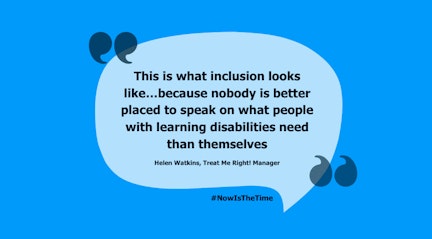Now is the time
-
Blogs

This National Inclusion Week, Certitude’s Treat Me Right! Manager, Helen Watkins, talks about the continued importance of including and valuing lived experience when developing positive practice.
The recent publication of the delayed ‘Learning from the lives and deaths of people with a learning disability and autistic people’ (LeDeR) report has shown us that people with learning disabilities and autistic people still face significant inequalities in health outcomes, dying, on average, 19.5 years younger than the general population. Often avoidably, if only given the right care and attention. However, one of the report's encouraging findings, showed an increase in positive practice.
It could be argued that this is mainly down to growing awareness. The Oliver McGowan Mandatory Training programme continues to be rolled out across the NHS and Certitude’s Treat Me Right! team have been delivering awareness training and consultancy to health and social care professionals for many years. We know firsthand that this improves how people are treated by health and social care practitioners, particularly when people with lived experience coproduce training.
Now is the time to build on that awareness to reduce these health inequalities. Recommendations in the LeDeR report from Chief Investigator Professor Andre Strydom, include the need for continued “initiatives such as annual health checks and support when people are admitted to hospital”.
Recently, Treat Me Right! were asked by North West London Integrated Care Board to be the voice of lived experience in a training event for GPs and other front line health care workers. Anne and Berge were asked to talk about reasonable adjustments at Annual Health Checks and what made a good Health Action Plan. Presenting alongside doctors, nurses and psychiatrists, their personal perspectives as people who have experienced Annual Health Checks were particularly valued and attendees scored the session 9/10. Anne and Berge felt very proud to have taken part in something that was so well received.
This is what inclusion looks like. Anne and Berge were treated as the true professionals and experts that they are – because nobody is better placed to speak on what people with learning disabilities need than themselves.



